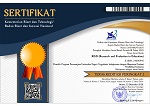Assessment of the social attitude of primary school students
Siti Partini Suardiman, Graduate School of Universitas Negeri Yogyakarta, Indonesia
Abstract
The implementation of Curriculum 2013 at primary school level brings about its own problems to teachers. A serious problem emerges in the assessment, especially the assessment of core competence for the social attitude aspect. This problem arises because social attitude has many dimensions and requires judgments in diverse forms. In addition, the assessment of social attitude is focused on the affective sphere. The objective of this research is to assess the social attitude of grade IV and/or V students of primary school using three integrated instrument models: self-assessment (SA), peer assessment (PA), and observational assessment (OA). This research employed qualitative approach. The respondents were 58 students chosen by using cluster random sampling and purposive sampling techniques. The data were collected through direct disclosure questionnaire and observation, and analyzed descriptive quantitatively. The results of the research are as follows: (1) the component of honesty attitude is in category A (entrusted); (2) the component of discipline is in category A (entrusted); (3) the responsibility component is in category B (developing); (4) the politeness component is in category B (developing); (5) caring component is in category B (developing); (6) confidence component is category A (entrusted); and (7) students' social attitude is mainly in category B (good) which indicates that most students have good social attitude.
Keywords
Full Text:
PDFReferences
Ahmadi, H. A. (2002). Psikologi sosial. Jakarta: Rineka Cipta.
Azwar, S. (2009). Penyusunan skala psikologi. Yogyakarta: Pustaka Pelajar.
Azwar, S. (2015). Skala pengukuran sikap manusia. Yogyakarta: Pustaka Pelajar.
Bernann, S. L. (2015). Pengetahuan, sikap, dan perilaku manusia. Yogyakarta: Parama Publishing.
Crano, W. D., & Prislin, R. (2011). Attitudes and attitude change. New York, NY: Psychology Press.
Ekowarni. (2009). Pedoman pendidikan akhlak mulia siswa sekolah dasar. Jakarta: Departemen Pendidikan Nasional, Direktorat Pendidikan Dasar dan Menengah.
Gerungan, W. A. (2004). Psikologi sosial. Bandung: Refika Aditama.
Khilmiyah, A., Sumarno, S., & Zuchdi, D. (2015). Pengembangan model penilaian keterampilan intrapribadi dan antarpribadi dalam pendidikan karakter di sekolah dasar. Jurnal Penelitian Dan Evaluasi Pendidikan, 19(1), 1–12. https://doi.org/10.21831/pep.v19i1.4550
Koellhoffer, T. T. (2009). Character education being fair and honest. New York: Infobase Publishing.
Krathwohl, D. R., Bloom, B. S., & Masia, B. B. (1973). Taxonomy of educational objectives Book 2/Affective domain. New York, NY: Longmans, Green.
Kurniawan, D. (2014). Pembelajaran terpadu tematik (Teori, praktik, dan penilaian). Bandung: Alfabeta.
Mardapi, D. (2012). Pengukuran, penilaian, dan evaluasi pendidikan. Yogyakarta: Nuha Medika.
Mardapi, D. (2017). Pengukuran penilaian dan evaluasi pendidikan (2nd ed.). Yogyakarta: Parama.
McCoach, D. B., Gable, R. K., & Madura, J. P. (2013). Instrument development in the affective domain: School and corporate applications. New York, NY: Springer.
Nunally, J. C. (1981). Psychometric theory (3rd ed.). New York, NY: McGraw-Hill.
Retnawati, H. (2016). Proving content validity of self-regulated learning scale (The comparison of Aiken index and expanded Gregory index). REiD (Research and Evaluation in Education), 2(2), 155–164. https://doi.org/10.21831/reid.v2i2.11029
Stiggins, R. J. (1999). Assessment, student confidence, and school success. The Phi Delta Kappan, 81(3), 191–198.
Sunyoto, D. (2012). Validitas dan reliabilitas. Yogyakarta: Nuha Medika.
Supardan, D. (2011). Pengantar ilmu sosial: Sebuah kajian pendekatan struktural. Jakarta: Bumi Aksara.
Syamsudin, A. (2015). Model penilaian afektif siswa sekolah dasar. Doctoral dissertation, Universitas Negeri Yogyakarta, Yogyakarta.
Waryadi. (2013). Menyiasati pelaksanaan penilaian sikap dalam implementasi kurikulum 2013. Jakarta: Balitbang Kemenag.
Zuchdi, D., Prasetyo, Z. K., & Masruri, M. S. (2012). Model pendidikan karakter terintegrasi dalam pembelajaran dan pengembangan kultur sekolah. Yogyakarta: UNY Press.DOI: https://doi.org/10.21831/reid.v4i1.19284
Refbacks
- There are currently no refbacks.

This work is licensed under a Creative Commons Attribution-ShareAlike 4.0 International License.








.png)







